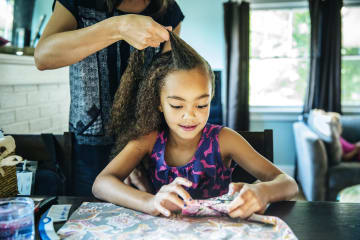Learning About Talking to Your Daughter About Puberty and Menstruation

How can you talk about puberty and menstruation?
You might think there is some magical age to have "the talk" with your daughter. But it's a lot easier and more effective to have an ongoing, open dialogue about all the changes her body and mind go through as she grows and develops.
Here's some help with how to do that.
- Let her know that puberty is just a normal part of growing up.
Think of teaching about puberty as an extension of teaching about losing your teeth, or getting taller. Make sure to:
- Use real, anatomical words (vagina, vulva, breasts, menstruation). This reduces confusion and shame.
- Try to stay calm and relaxed. Your feelings and reactions will be noticed as much as your words.
- Be open to questions. If you're not sure how to answer, you can say, "That's a good question. Can I take a little time to get back to you with an answer?" Or you can say, "That's a good question. What made you think of that?" Or "What do you already know about that?"
- Let her know it's normal to feel excited, scared, confused, or awkward. For example, before puberty, she may feel strong and coordinated. And when puberty hits, she may feel clumsy because her bones are growing so fast.
- Look for teachable moments.
Find ways to prompt conversation in everyday contexts. For instance, when you're unpacking a grocery bag that contains deodorant:
- Say: This needs to go in my bathroom. By the way, do you know what deodorant is for?
- Explain: Deodorant is something people use under their armpits to help with body odour. If you notice any changes in the way you smell, it may be time to wear it.
When you're folding laundry that includes a bra:
- Say: I was wondering if any of your friends are wearing a bra, and if you might be interested in going shopping for one?
- Explain: Training bras can help girls feel more comfortable as their breasts develop.
When a tampon or pad commercial comes on TV:
- Say: Have you ever heard of tampons or pads? Do you know what they're for?
- Explain: Pads and tampons help collect the fluids that come from the uterus out through the vagina after a girl gets her period (starts menstruating). Menstruation is a normal process that happens to all girls, sometime between the ages of 9 and 15. It means your body is becoming more adult-like, and is capable of growing a baby.
- Explain what puberty means.
- Let your daughter know that puberty is the time in her life when she starts to grow and change into an adult. During this time, her body goes through a lot of changes.
- Some girls start puberty early (ages 8–9). Others start later (ages 14–15). It's all normal. Let her know that the time when puberty starts can vary. And it can take 3 to 5 years to go through it.
- Help your daughter understand what changes to expect.
Body changes:
- She may first start to notice breast buds or a bit of hair growth under the arms or in the pubic area.
- As her breasts develop, they may hurt or be tender. And one breast may be bigger than the other.
- Later, she might notice that she has body odour, or starts to get pimples.
- In time, her body may get rounder and taller.
Brain changes:
- She may start to feel and think differently as she starts exploring how to be her own person. She may feel grouchy or moody for no reason. Let her know these feelings are normal and won't last forever.
- She may feel more independent, want to do more things on her own, or want more privacy or time with friends.
Menstruation:
- She may get her period a few years after other changes begin. At first, her periods may not be regular.
- If she wants to start carrying supplies, show her how to carry pads or tampons discreetly in a small bag in her backpack.
- You can also discuss ways to deal with cramps (heating pad, pain medicines) or PMS (eating healthy foods, exercising, or talking out emotions).
- Get help.
It can be great to provide helpful resources for your daughter. Ask the school counsellor or your pediatrician to recommend books, videos, or classes. Check out the website www.caringforkids.cps.ca for more tips.
Where can you learn more?
Go to https://www.healthwise.net/patientEd
Enter P320 in the search box to learn more about "Learning About Talking to Your Daughter About Puberty and Menstruation".
Adaptation Date: 03/02/2022
Adapted By: Alberta Health Services
Adaptation Reviewed By: Alberta Health Services
